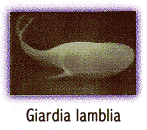What's Bugging You?
Why Should I be concerned about parasites?
Parasites are much more common in the United States and other developed countries than you may realize. They also cause many diarrheal diseases, which can lead to serious illness and even death. An intestinal parasite can weaken your body's natural immune system, making you more susceptible to other illnesses. The frequency of world travel and increased immigration to the United States has resulted in the significant spread of parasitic infection.
What are intestinal parasites?

Intestinal parasites are organisms that live within the intestinal tract, growing and feeding off your body. They range from visible worms (like tapeworms and pinworms) to microscopic organisms such as Giardia Lamblia.
How do you get parasites?
Parasites are found in raw and undercooked food and treated and untreated water; are transmitted by insects and household pets; and are passed from person to person through unsanitary habits and poor hygiene.

Parasites travel in different ways. For example, the microorganism Giardia, which causes persistent diarrhea, fever, cramps and other symptoms, is contained in feces. It gets into public water supplies when animal or human sewage contaminates the water source. It can also be transmitted from person to person through careless diaper changing and poor hygiene in day care centers. Another parasite, Cryptosporidium, infests public water systems and can cause widespread outbreaks of severe diarrhea and cramps. It has been found in water supplies throughout the United States, and the disease it causes can prove fatal for people with weakened immune systems.

Other parasites are found in raw, rare or undercooked meats and fish, while others are in contaminated soil. Many immigrants to the United States unknowingly carry parasites that can produce symptoms in Americans, transmitting the organisms into food through unsanitary practices in restaurant kitchens.
How can I tell if I have a parasites?
Many symptoms of a parasitic infection are similar to other illnesses, making it particularly important to test for parasites for proper diagnosis and treatment. A comprehensive parasite test, using a stool sample analyzed by a laboratory specializing in parasite testing, is the most effective way to diagnose this type of infection.
How do you treat parasites?
Eliminating the parasitic infection is the key to relieving the symptoms of infection, or the parasites will continue to grow and reproduce. Dr. Bachman will use a variety of treatments to eliminate parasites, including antiparasitic drugs, diet changes and adding "friendly" bacteria to your gastrointestinal tract.
What are the symptoms of a parasite infection?
Almost any persistent digestive disorder could result from a parasite. The most common symptoms are diarrhea and abdominal pain. Other symptoms include nausea, vomiting, gas and bloating, foul-smelling stools, anorexia or weight loss, gastritis, fever and chills, headache, constipation, blood or mucus in stools, and fatigue.
Other health problems can result from disturbed digestive processes or toxins produced by the parasite, such as aches and pains in the joints and muscles, anemia, allergies, chronic fatigue, immune dysfunction, sleep disturbances and depression.
Ongoing irritation from a parasitic infection can alter the lining of your intestine, creating the "leaky gut" syndrome which permits toxic compounds to permeate into the body through the intestine. A variety of disorders, including food allergy and inflammatory bowel disease, can result from altered intestinal permeability.
